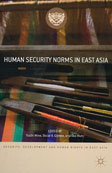Human Security Norms in East Asia

Many East Asian countries have realized high economic growth; however, their economic growth is not necessarily aligned with human security. What challenges do people in East Asia face, and what paths have each of the countries in the region taken in their quest to assure human security?
This book reveals how the concept of human security has been embraced, criticized, modified and diffused in East Asian countries (ASEAN Plus Three), where people are vulnerable to an array of insecurities such as natural disasters, infectious diseases, armed conflicts, pollution and extreme poverty.
The book argues that given the kaleidoscopic diversity of the human security stakeholders and the range of values that exist in the region, Asian stakeholders tend to interpret the concept of human security according to their particular cultural contexts, placing specific importance on the elements of human dignity and empowerment. The volume asserts that “This dignity element, together with national ownership, may be the most important values added in the Asian version of human security.”
This book manifests the culmination of the JICA Research Institute’s research project titled “Human Security in Practice: East Asian Experiences Phase I.”
Along with this book presenting country-specific research outcomes, a volume titled “Human Security and Cross-Border Cooperation in East Asia” has been published as the outcome of the issue-based research project organized by JICA-RI, “Human Security in Practice: East Asian Experiences Phase II.”
scroll